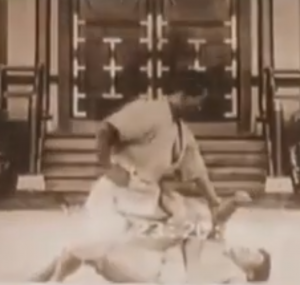References
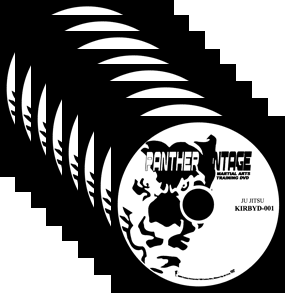
Budoshin Jujitsu Technique Cross-Reference Index: Belt-Video 05/20
If you’re looking for a simple belt/kyu-dan cross-reference based upon the technique sequence in the Budoshin Jujitsu Black Belt Home Study Course [dvd or mp4 format], here it is thanks to Sensei George Cushinan, 5th dan Renshi.
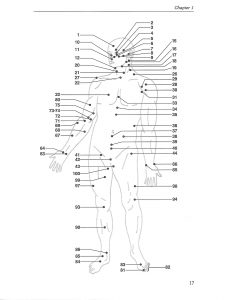
Pressure Points Reference Chart 8/20
This resource, showing 100 vital points on the human body, is for your personal use only. It may not be reproduced or sold without the express written consent of the author and/or the publisher, and may be used only within the copyright laws of the United States of America and if appropriate credit is given as stated on the actual Reference Chart download.
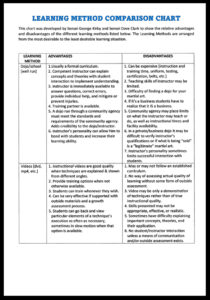
Learning Method Comparison Chart 9/22
This chart was developed by Sensei George Kirby and Sensei Dave Clark to show the relative advantages and disadvantages of the different learning methods. The Learning Methods [dojo, videos, books, live seminars, zoom seminars, friend,] are arranged from the most desirable to the least desirable learning situation.
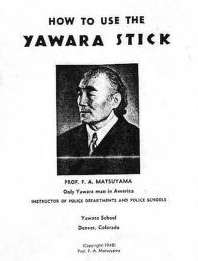
How to Use the Yawara Stick
This short book, published in 1948 by F.A. Matsuyama was recommended to me by Sensei Jerry Heines. If you’re interested in a copy click on the name of the book for this great historical resource. For a good history of the yawara stick [and also yawara in general] by Don Rearic click on this link: http://www.donrearic.com/yawara.html .
For Budoshin Jujitsu yawara/koshi-no-bo techniques click here to get the Budoshin Jujitsu 2013 Summer Camp mp4 videos. Techniques are in Part 1.
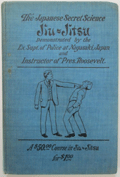
The Japanese Secret Science Jiu-Jitsu [published 1905] 2/17
I don’t know how long this link will be active but you need to download this great historical resource showing jujitsu techniques taught to President “Teddy” Roosevelt. Thanks to Robert Harland for making this resource available. Lots of “Budoshin Jujitsu” techniques! 🙂 Click on the title to download the link!

Downloadable Resources from JudoInfo.com
Andrew Zerling turned me onto this site as a great resource for downloading really old [and some current] martial arts resources [books, manuals, excerpts]. Just click HERE to go to their “Judo Books” page.
Three sources that I found to be very interesting were:
Fatal Blows & Kuatsu, by Kano -2005: click HERE
Hagakure, by Tsunetomo – 2005: click HERE
Principles of Jujutsu, by Kano – 2013: click HERE
United States Marine Corps Close Combat – 1999: click HERE
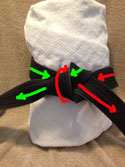
Tie Your Obi in 4 Easy Steps 10/14
Follow the arrows and directions on these 4 pix of how to tie your belt properly and be done in a snap. Yes, the belt knot points to your right!
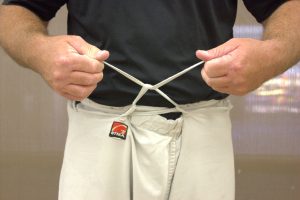
Tie Your Gi Pants in 8 Simple Steps 7/16
Students come up with all sorts of inventive ways to tie their pants, many of which don’t keep their pants up. Here’s a simple 8-step process that’s simple enough for anyone to follow — and it works. My students really appreciate this pictoral instruction page. It save them from the potential of embarassment in class.
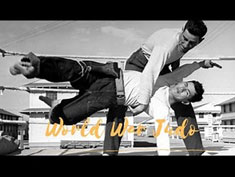
World War I & II Judo Training
This historical video, found on YouTube, discusses the Judo training in both world wars and the life of Captain Allan Smith, and the aspect of self defense drilling. The skills taught were referred to as judo rather than jujitsu as “judo” was the more commonly accepted term for judo self-defense [jujitsu] at the time. Thanks to Gary Witus for this historical reference.
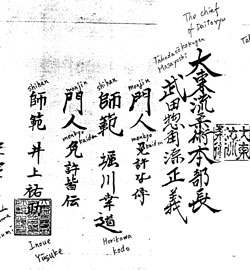
Daitoryu Densho
Every traditional Japanese Jujitsu ryu has a densho, or scroll of the core techniques of the art. I was fortunate to receive this densho several years ago from an anonymous source. Usually the densho is handed down from the senior sensei to the most senior student who has already proved himself to be the future senior sensei of the ryu. Although the scroll is in kanji, someone added notes in English at some point, perhaps giving it a bit more or less value, dependent upon who you are.
